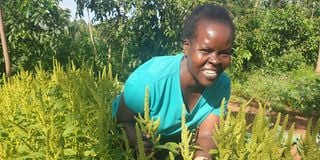Vihiga farmers reap from rising demand for indigenous foods

Florence Migosa at her farm where she is growing terere (amaranth) for seed production. Farmers in Vihiga are reaping big from rising demand for traditional foods and vegetables.
Mid-morning on a Wednesday, Evans Ochuto checks on his indigenous vegetables farm. Although rather small, the farm is characterised by raised beds, each measuring about one by three meters.
Ochuto is the chairman of Vihiga Nutrition and Community Seed Bank and has to lead by example in multiplying and saving seeds.
In his house, he has set aside a section where he stores saved seeds in recycled liquor bottles. He has several varieties of seeds, especially traditional vegetables, including amaranth, black night shade and Ethiopian kales among others.
He doubles as the chairman of Itumbo farmers group, which is among the ten under the Vihiga Nutrition and Community Seed Bank.
In Milimani village within the same county, Florence Migosa tends her vegetables. They are at different stages of growth and so are their varieties.
Amaranth for example, has already produced seeds and she will be harvesting the same in a few days. The seeds for mito, another indigenous vegetable variety, are dry and ready for harvesting.
Ms Migosa does not only benefit from seeds multiplication, she also sells the vegetables to neighbours and friends.

The recently launched Vihiga Nutrition and Community Seed Bank.
Earnings
“Yesterday I sold vegetables worth Sh350 and that was how I earned money for my family’s food,” she says.
“Last year I earned Sh9,600 from sale of seeds and I spent the money on paying school fees for my child who was joining high school,” she adds.
Her farm is a face of diversity characterised by various vegetables, arrow roots, cassava, bananas, maize, and beans among other food crops.
The two farmers are among those who have benefitted from various trainings and other support, thanks to The Alliance Bioversity and International Centre for Tropical Agriculture (CIAT).
“I used to just broadcast vegetable seeds but I have since learnt to plant them on raised beds as this way soil retains moisture and I protect the crops from floods,” says Ms Migosa.
Speaking while officially opening the Vihiga Community Nutrition and Seed Bank, Vihiga Governor Wilber Ottichilo noted that there is rising demand for indigenous foods especially traditional vegetables.
Link farmers to hospitals
But he noted that there is need for strategic marketing of the same, adding that his administration will link farmers’ groups with hospitals where they will supply the vegetables.
“From next year, the county government plans to start providing food to children in early childhood development centres and this will be another strategic market for the produce,” he said.
Dr Ottichilo encouraged farmers to work hard in production and adopt new farming technologies in a bid to cope with climate change.
Dr Celine Termote, the Africa Team Leader for Food Environment and Consumer Behaviour at CIAT said the organisation has been working with over 300 farmers in Vihiga County since 2014.
“Our focus was on improving diets, but as we realised, there was need for access to seeds and that was how the concept of a seed bank was born,” said Dr Termote.

Evans Ochuto checks on some of the traditional vegetables he is growing on his farm.
Traditional vegetable varieties
“The seed bank we have launched is home to over 30 varieties of traditional vegetables, 13 of sorghum while others include beans and recently introduced fruits. We are optimistic that many other varieties will be available.”
Vihiga is now expected to produce both seeds and vegetables and also go beyond this to produce legumes, cereals and fruits. The communities involved in this venture can then brand both the seeds and produce and sell them across Kenya and beyond.
Additionally, the seed bank will become a learning centre as well as a place where farmers can access services such as banking and insurance.
“With agro-ecology, agro-diversity and nature-positive agriculture gaining popularity every day, setting seed banks is a great way of helping small holder farmers to contribute towards these noble courses. This way, the small holder farmers will also be doing their due diligence towards combating the effects of climate change,” said Dr Termote.
Lillian Aluso, the project coordinator for diverse seeds and planting materials supporting farm resilience, inclusive value chains and healthy diets in a sustainable food system in Vihiga County said farmers are gradually embracing crop and diet diversification.
Paradigm shift
“There has been a paradigm shift in terms of on-farm diversity from growing only maize and beans to ensuring as many food groups as possible are grown on the farm,” said Ms Aluso, who represents The Alliace in Vihiga County.
Besides producing food crops, especially traditional leafy vegetables, for their own family consumption, the farmers are now selling the surplus and earning income which has improved their livelihoods.
Through the series of trainings, the farmers are now doing farmer-to-farmer training which has enhanced their self-esteem and leadership capacity.
Kenya, Ms Aluso noted, is endowed with a rich agrobiodiversity which is important in sustaining its food system. But gradually, some varieties are becoming rare and might become extinct. To mitigate against such an eventuality, seed saving is one approach that can be embraced to not only promote on-farm and dietary diversity but to also conserve the threatened and rare varieties which are not only nutritious but also resilient to shocks such as climate change.

Governor Wilber Ottichilo cuts a ribbon to officially open the Vihiga Nutrition and Community Seed Bank.
Opportunity for women, youth
With many people shifting from processed to indigenous and whole foods, there is an opportunity for women and the youth to utilise the shift as an entrepreneurial opportunity where they can conserve seeds and cultivate these crops.
But Ms Aluso notes there are some challenges through this journey, one being that agro-ecological practices are not immediate and require patience. Like in other sectors, erratic weather patterns occasioned by climate change have affected this line of agriculture.
Ms Aluso hopes that in future, the Vihiga Community Seed Bank will develop into a thriving organisation which will supply smallholders with a more diverse range of high-quality seeds from locally important, nutrient-dense crops that nourish people and build immunity.
The seed bank will also act as an information hub for the exchange of experiences and learning on market linkages, business models and agroecology, with outreach to 10 sub-locations.
It is further expected to act as a platform that facilitates engagement and dynamic dialogue with the public and private sector stakeholders.





